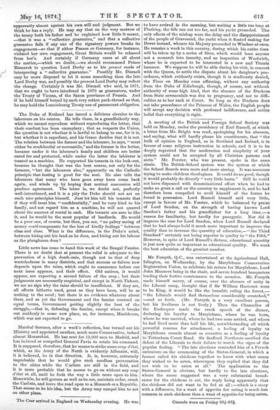The Duke of Rutland has issued a delicious circular to
the labourers on his estates. He tells them, in a grandfatherly way, which we cannot reproduce without reproducing the letter, that their conduct has been exemplary ; that as respects the Union, the question is not whether it is lawful to belong to one, for it is, but whether it is expedient, and his Grace decides that it is not. The relation between the farmer and the labourer, he says, "must either be confidential or mercantile," and the former is the better, because under it the labourer's family and children are better eared for and protected, while under the latter the labeturer is treated as a machine. He supported his tenants in the lock-out, because he thought that was the best course, not only for the farmers, "but the labourers also," apparently on the Catholic principle that fasting is good for the soul. He also tells the labourers that many who have gone away have come back .again, and winds up by hoping that mutual concession will produce agreement. The letter is, we doubt not, perfectly -well-intentioned, and it is a pity the Duke should not act on such nice principles himself. Just let him tell his tenants that if they will treat him "confidentially," and be very kind to his family, and not regard him as a machine, he will not quarrel about the amount of rental in cash. His tenants are sure to like -it, and he would be the most popular of landlords. He would lie a poor one, of course, but then, you see, "no paltry saving of money-could compensate for the loss of kindly feelings" between -class and class. What is the difference, in the Duke's mind, between hiring out his land as he does, and hiring out his labour as the ploughman does ?


































 Previous page
Previous page